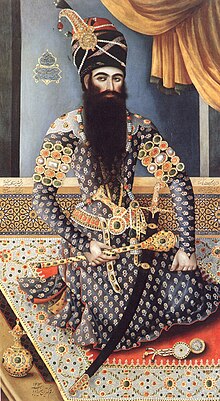Fat′h-Ali Shah Qajar
| Fath-Ali Shah Qajar فتحعلی شاه قاجار |
|||||
|---|---|---|---|---|---|
Shahanshah of Persia |
|||||
 |
|||||
| Shah of Iran | |||||
| Reign | 17 June 1797 – 23 October 1834 | ||||
| Predecessor | Mohammad Khan Qajar | ||||
| Successor | Mohammad Shah Qajar | ||||
| Born |
5 September 1772 Damghan, Iran |
||||
| Died | 23 October 1834 (aged 62) Isfahan, Iran |
||||
| Burial | Qom | ||||
| Spouse | Numerous wives, including Taj Al-Duleh |
||||
| Issue Detail |
Mohammad Ali Mirza Abbas Mirza |
||||
|
|||||
| Dynasty | Qajar | ||||
| Father | Hossein Qoli Khan Qajar | ||||
| Mother | Agha Baji | ||||
| Religion | Shia Islam | ||||
| Tughra |  |
||||
| Full name | |
|---|---|
| Fath Ali Shah |
Fath-Ali Shah Qajar (Persian: فتحعلى شاه قاجار; var. Fathalishah, Fathali Shah, Fath Ali Shah; 5 September 1772 – 23 October 1834) was the second Qajar emperor (shah) of Iran. He reigned from 17 June 1797 until his death. His reign saw the irrevocable ceding of Iran's northern territories in the Caucasus, comprising what is nowadays Georgia, Dagestan, Azerbaijan, and Armenia, to the Russian Empire following the Russo-Persian Wars of 1804–13 and 1826–28 and the resulting treaties of Gulistan and Turkmenchay. Historian Joseph M. Upton says that he "is famous among Persians for three things: his exceptionally long beard, his wasp-like waist, and his progeny."
At the end of his reign, his difficult economic problems and military and technological liabilities took Iran to the verge of governmental disintegration, which was quickened by a consequent struggle for the throne after his death.
He was born in Damghan on 5 September 1772, and was called Fath-Ali, a name which his great-grandfather, a prominent figure bore. He was the son of Hossein Qoli Khan Qajar, brother of Agha Mohammad Khan. He was also known by his second name of Baba Khan, a name he would use until his coronation in 1797.
Fath-Ali was governor of Fars when his uncle was assassinated in 1797. Fath-Ali then ascended the throne and used the name of Fath Ali Shah (with the word "shah" added on his name). He became suspicious of his chancellor Ebrahim Khan Kalantar and ordered his execution. Hajji Ebrahim Khan had been chancellor to Zand and Qajar rulers for some fifteen years.
...
Wikipedia
